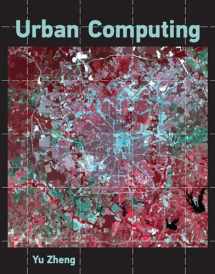
Urban Computing (Information Systems)
Book details
Summary
Description
An authoritative treatment of urban computing, offering an overview of the field, fundamental techniques, advanced models, and novel applications.
Urban computing brings powerful computational techniques to bear on such urban challenges as pollution, energy consumption, and traffic congestion. Using today's large-scale computing infrastructure and data gathered from sensing technologies, urban computing combines computer science with urban planning, transportation, environmental science, sociology, and other areas of urban studies, tackling specific problems with concrete methodologies in a data-centric computing framework. This authoritative treatment of urban computing offers an overview of the field, fundamental techniques, advanced models, and novel applications.
Each chapter acts as a tutorial that introduces readers to an important aspect of urban computing, with references to relevant research. The book outlines key concepts, sources of data, and typical applications; describes four paradigms of urban sensing in sensor-centric and human-centric categories; introduces data management for spatial and spatio-temporal data, from basic indexing and retrieval algorithms to cloud computing platforms; and covers beginning and advanced topics in mining knowledge from urban big data, beginning with fundamental data mining algorithms and progressing to advanced machine learning techniques. Urban Computing provides students, researchers, and application developers with an essential handbook to an evolving interdisciplinary field.


We would LOVE it if you could help us and other readers by reviewing the book
Book review



